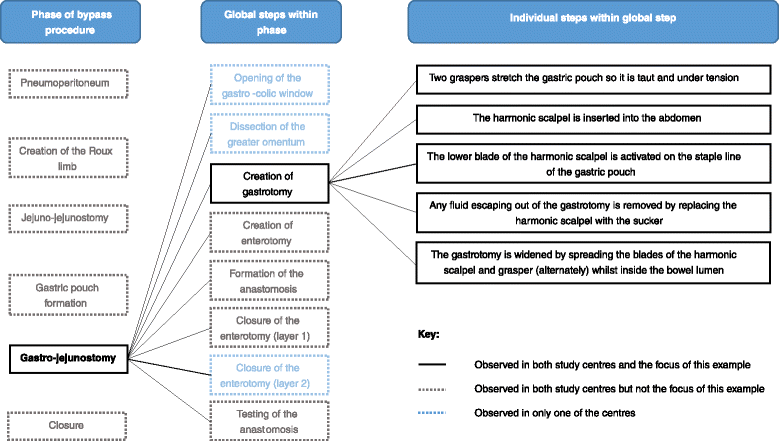Novel ways to explore surgical interventions in randomised controlled trials: applying case study methodology in the operating theatre
- PMID: 26710760
- PMCID: PMC4693411
- DOI: 10.1186/s13063-015-1127-x
Novel ways to explore surgical interventions in randomised controlled trials: applying case study methodology in the operating theatre
Abstract
Background: Multi-centre randomised controlled trials (RCTs) in surgery are challenging. It is particularly difficult to establish standards of surgery and ensure that interventions are delivered as intended. This study developed and tested methods for identifying the key components of surgical interventions and standardising interventions within RCTs. Qualitative case studies of surgical interventions were undertaken within the internal pilot phase of a surgical RCT for obesity (the By-Band study). Each case study involved video data capture and non-participant observation of gastric bypass surgery in the operating theatre and interviews with surgeons. Methods were developed to transcribe and synchronise data from video recordings with observational data to identify key intervention components, which were then explored in the interviews with surgeons.
Results: Eight qualitative case studies were undertaken. A novel combination of video data capture, observation and interview data identified variations in intervention delivery between surgeons and centres. Although surgeons agreed that the most critical intervention component was the size and shape of the gastric pouch, there was no consensus regarding other aspects of the procedure. They conceded that evidence about the 'best way' to perform bypass was lacking and, combined with the pragmatic nature of the By-Band study, agreed that strict standardisation of bypass might not be required.
Conclusions: This study has developed and tested methods for understanding how surgical interventions are designed and delivered delivered in RCTs. Applying these methods more widely may help identify key components of interventions to be delivered by surgeons in trials, enabling monitoring of key components and adherence to the protocol. These methods are now being tested in the context of other surgical RCTs.
Trial registration: Current Controlled Trials ISRCTN00786323 , 05/09/2011.
Figures
References
Publication types
MeSH terms
Associated data
Grants and funding
LinkOut - more resources
Full Text Sources
Other Literature Sources
Medical


